Kiddus I ADD
The Salmon - Interview with Kiddus I and BazBaz
10/18/2024 by Angus Taylor
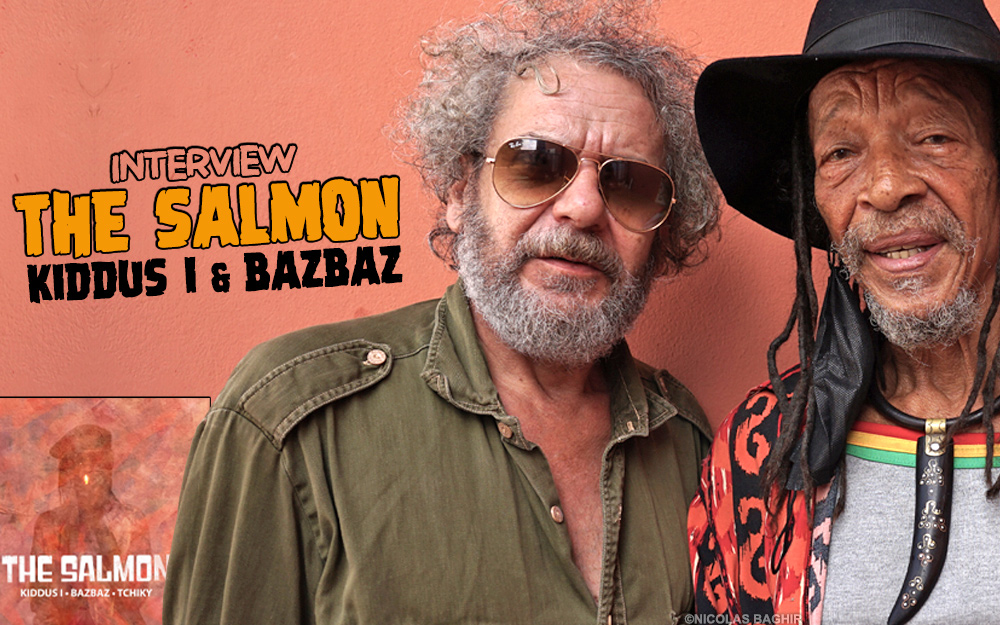
The tradition of French and Jamaican artists collaborating has been a fruitful one. Perhaps its most famous instance was Serge Gainsbourg’s 1979 album Aux armes et cætera, where the Parisian pop provocateur enlisted the I-Threes, and cream musicians Sly & Robbie, the Chung brothers, Robbie Lyn, Ansell Collins, Dougie Bryan and Sticky Thompson.
One of the French artists continuing this tradition in the 21st century is Camille Bazbaz. His series of collaborations with Jamaican singer songwriter Winston McAnuff, A Drop (2005) and A Bang (2011), reversed Gainsbourg’s approach of adding his vocals to reggae arrangements, by laying Winston’s lyrics and vocals over Bazbaz’ eclectic soulful pop rhythms.
These ventures led Bazbaz to form links with other Jamaican veterans, including smoky voiced Rasta crooner, artist, poet, percussionist, herbalist and star of the iconic 1978 film Rockers, Kiddus I. This month, Bazbaz, Kiddus and guitarist Jerome Tchiky Perez, released their long gestated project The Salmon, a series of Kiddus’ gnomic utterances over a glossy, lovingly produced mix of soul, blues, pop and reggae backings. After decades as a reggae singer, and latterday success as part of acoustic Nyabinghi ensemble Inna De Yard, this is a side to Kiddus I that has not been heard before, and suits him very well.
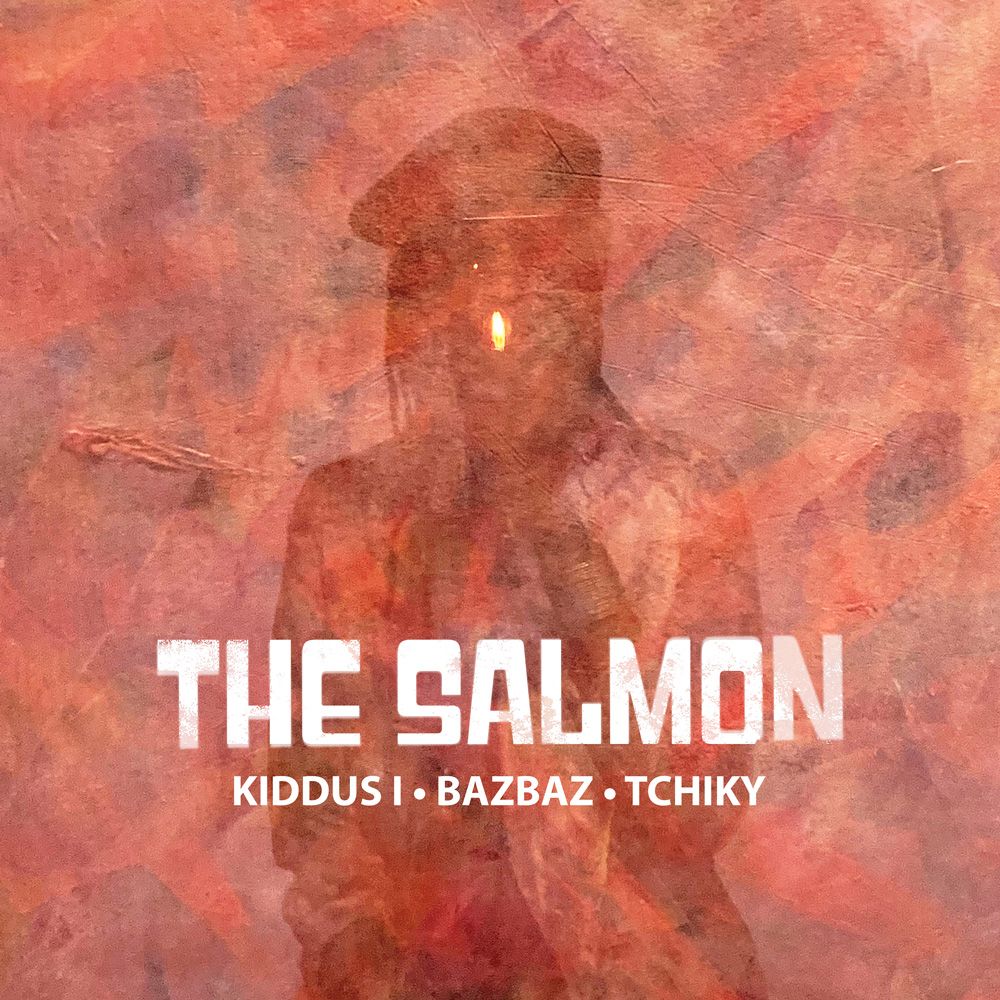
Reggaeville’s Angus Taylor spoke to Kiddus and Bazbaz from Jamaica and France respectively, via video call. It’s clear from this freeform and at times tangential interview how much regard these two old friends, working together on one album for nearly two decades, have for each other. Kiddus, as is his way, extrapolates from the specifics to the philosophical key principles of life. Bazbaz pulls the conversation back to the glorious, libertine experience of creating the record.
Unusually for a reggae interview, there is a lot of swearing. But it’s not crude or aggressive, just joyous - in the spirit of the Gallic and Jamaican sense of freedom that gave rise to this genre-bending project. The language is that of two self-described crazy individuals making music without limits. You have been warned.
How long have you been working on this album? 10 years? 15 years?
Kiddus: Closer to 20! Oh fucking hell. Camille, how long now, man?
Bazbaz: it's mad, it's mad, it's mad. (laughs)
Kiddus: I think it's about 17.
Bazbaz: I think it's about the age of my son.
An album is a bit like a child. Eventually you have to let it go out into the world.
Kiddus: Yes certainly. It takes you nine months and so that nine months period has been like two years each [month] (laughs)
Bazbaz: For the birth of this LP!
When exactly did it start?
Kiddus: I'm thinking about 2004 or 5.
Bazbaz: Something like that.
Kiddus: So it's almost 20 fucking years, man?
Bazbaz: It's an adventure.
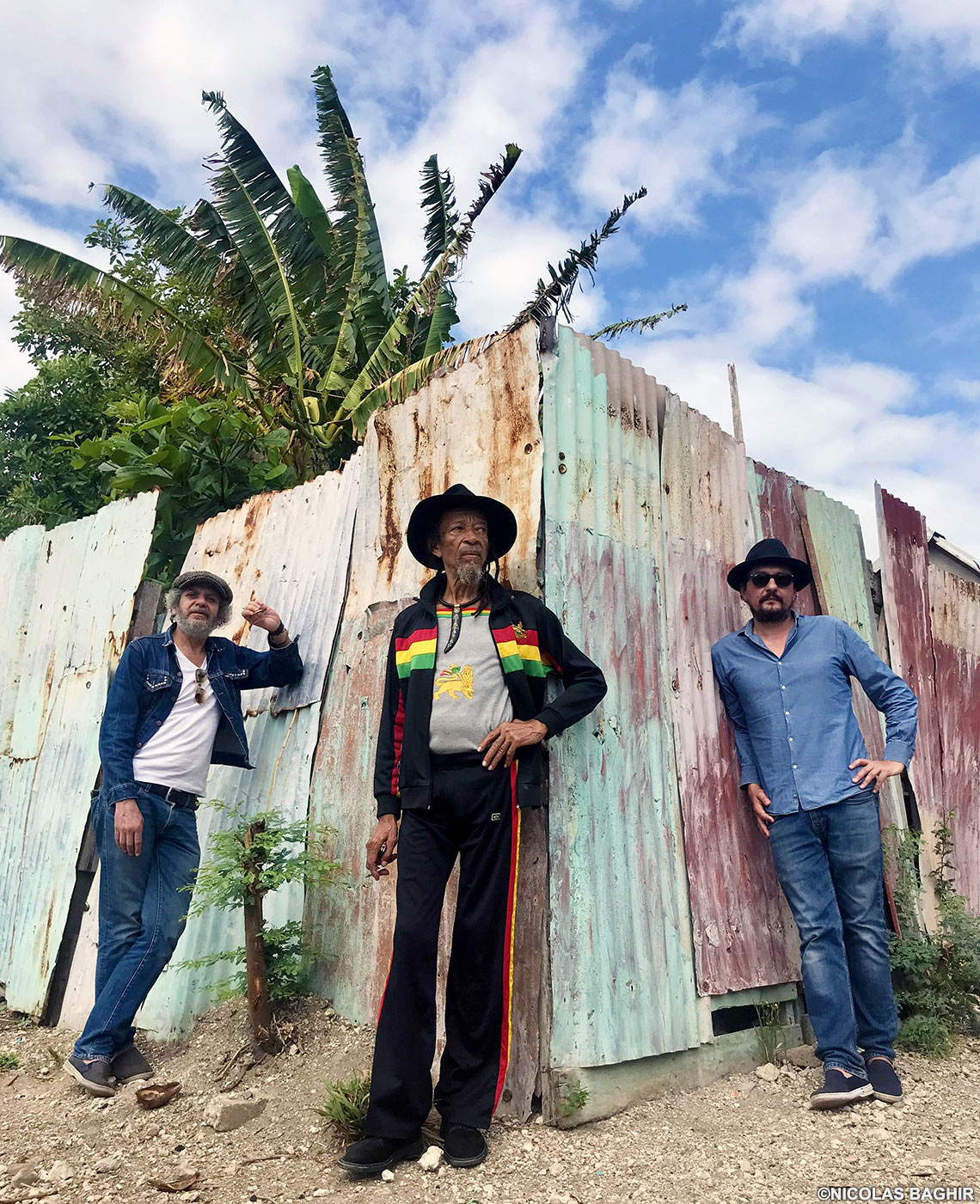
Did you meet through Winston McAnuff?
Kiddus: We met through Camille being with Winston. Winston being affiliated with us from the beginning. We would go jam together with Camille sometimes, me and Winston. At a little club he used to play at. And then I went to the studio and… what's his name again? Elbaz? [Arnaud Elbaz] Elbaz had a rhythm, Choices. Camille played and I wrote the song same time and we voiced it.
Bazbaz: The first song we did together was It's A Blues.
Kiddus: It's A Blues was the first one? Not Choices?
Bazbaz: That's the problem of beginning the project 17 years ago. We don't really remember exactly, you know? (laughs) But remember that it's Winston McAnuff who made us meet. I was working with Winston. I saw Winston in the street of Paris. With you. You met me in a bar in Paris. And you came with Winston. Because I'm a big fan of Kiddus I. Long, long time he was one of my favourite singers. I am a singer too and one of my goals was to sing like Kiddus, you know? It was very pretentious. And impossible. (laughs) But Kiddus was a big inspiration. And when I had the luck to meet him with the help of Winston…
Kiddus: We got on, man. We got on from day one. We had a mutual rapport together. The vibe from the beginning was amicable and friendly and at ease. We enjoyed each other. We had no problems. So that was the start of the programme and well it's borne fruits. And let's see what the fruits are… (laughs)
Bazbaz: We had no plan.
Kiddus: Every time we met, we continued. He had his little studio, so I'd go by many times and we just vibes and procreate at the same time. So it would continue like that. I'd leave and come back and we’d do something else.
Bazbaz: It's friendship, you know? As musicians the best way to express our friendship is to go in the studio and make music because this is what unifies all our discussions.
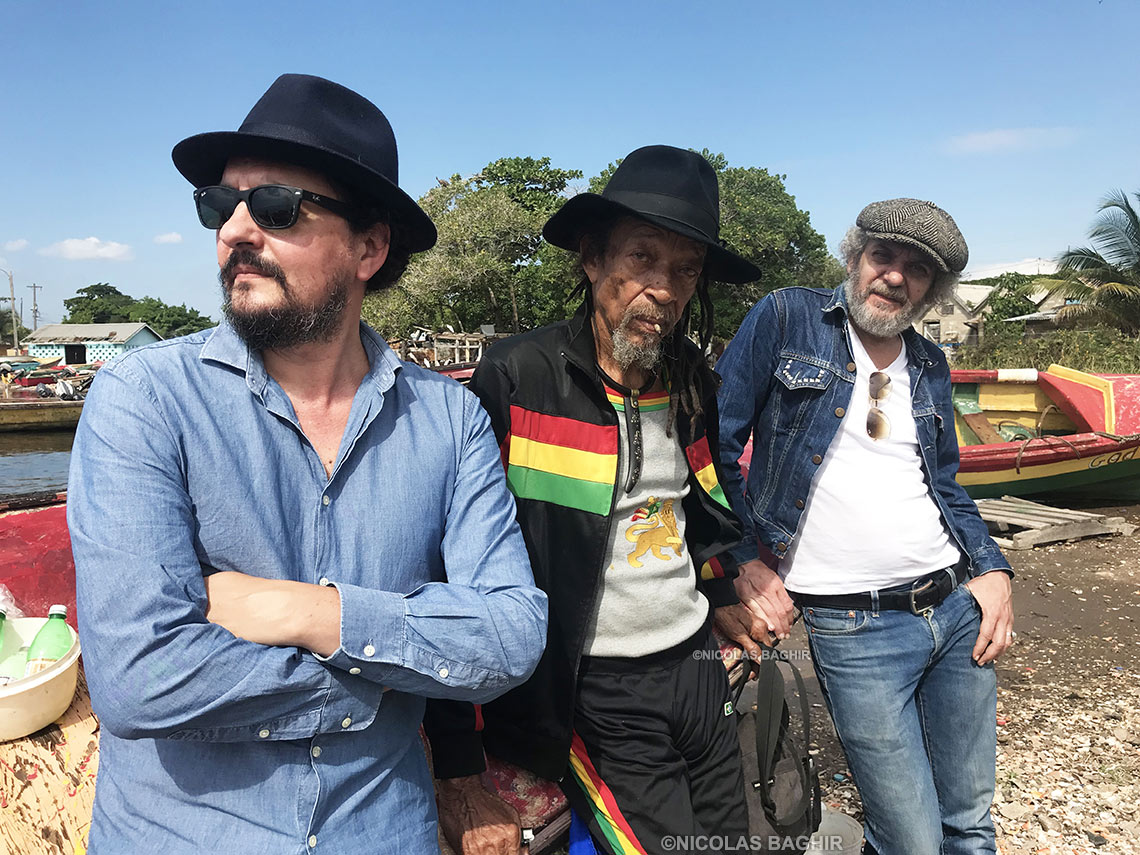
Kiddus: Musical hopes, musical dreams, visions. He will play something, I will have an idea and we work with it. He might come up with an idea. Tchiky came in afterwards or in the middle. When we were actually doing the creation and most of the songs, it was myself and Camille.
Bazbaz, was your prior awareness of Kiddus based on the film Rockers?
Bazbaz: The same. I saw Rockers, one of my favourite movies. And Kiddus is one of the heroes, even if maybe he's six minutes in the movie, but it was like the light. The sun came into my house when I saw this song Graduation In Zion. I was fond of this song. It was the only song I knew of Kiddus. I had it on the VHS you know? It is a part of the movie that is almost erased on the VHS because I was always listening to this fucking song. I was like “Wow man, what is this guy? What is this song? What is this voice?” So when, 20 years after, I met Kiddus, I was very impressed and we had a lot of fun. Talking shit. Talking about life. Talking about women. Talking about Babylon. And after a few hours I said to Kiddus “Let's go to my studio and make some music”. And the first song we did was not a reggae song. It was It's A Blues, kind of 50s. I love the lyrics of Kiddus. The way he writes. We had no plan.
Kiddus: No, we just work and whatever the inspiration came, we just go on it and work together and procreate together. All this time we had to be patient. It fulfilled what it should have done. So it's ready now for release. And we'll see how far it shoots.
Even with no plan it's significant that the first song you did was It's A Blues. Kiddus, you did a blues song on your 2009 Green Fa Life album called Rock Rock Rock. But this kind of 50s blues is the kind of music they used to play on sound systems in Jamaica at the very beginning.
Kiddus. The original Style. From those times, yes. That's a part of the legacy, the soul.
Bazbaz: And what is very interesting is that Kiddus I doesn't need me to do reggae music. Kiddus I is reggae music. Like all the Jamaican artists. So what was very funny, interesting, refreshing and gave me a lot of positive vibration is that Kiddus I is a free spirit. We can do a blues, we can do a soul one, we can do some reggae but to try to do something different than what is usual when a whitey goes to work with a Jamaican. So it was something free. It was beautiful. We can take some vibes from Eric Satie, like from the beginning of the century, classical simple piano, there is no limit when we make music.

Kiddus: No limits.
Bazbaz: I'm a reggae lover for sure. Reggae music is maybe for me the first black music I have understood and it has opened me to rhythm and blues, to soul music, to Marvin Gaye, Nat King Cole. Reggae has opened the door to me for all of this.
Kiddus I: Like I remember in ‘89 I went to England with some songs that aren't released. I went in with some great fucking songs man, but when I went to this company they were saying “Are you reggae? It's not that”. And I'm saying “Listen as a child growing my musical roots spread 360 degrees. From my trunk. And growing, the blues, the jazz, the classics, whatever, South American, the salsa, the merengue, the cha-cha, the blues from America, the rock and roll influenced me. It's a part of my musical trunk." So I'm saying “Hey, from my roots I have all of these genres of music rooted in me. I am the trunk. So when I grow up with all of these, my branches are going 360 degrees. You can't limit me in a tunnel vision, musically”. This is what I told the company. I said “Hey, this is world music and I make music for the world”.
And we try to make music with nyabinghi at the same time, the Rastafarian side but we're musically influenced by all the different genres that we grew up hearing. And so sometimes something will pop out of you and this is not really where you're looking at but embedded in you and the melody comes and a different vibes comes. And so you cross the boundaries and barriers. Touch different Minds. Maybe some people wouldn't want to listen to me singing total reggae but I can sing in a bluesy form, a jazzy style, a funky style, whatever style.
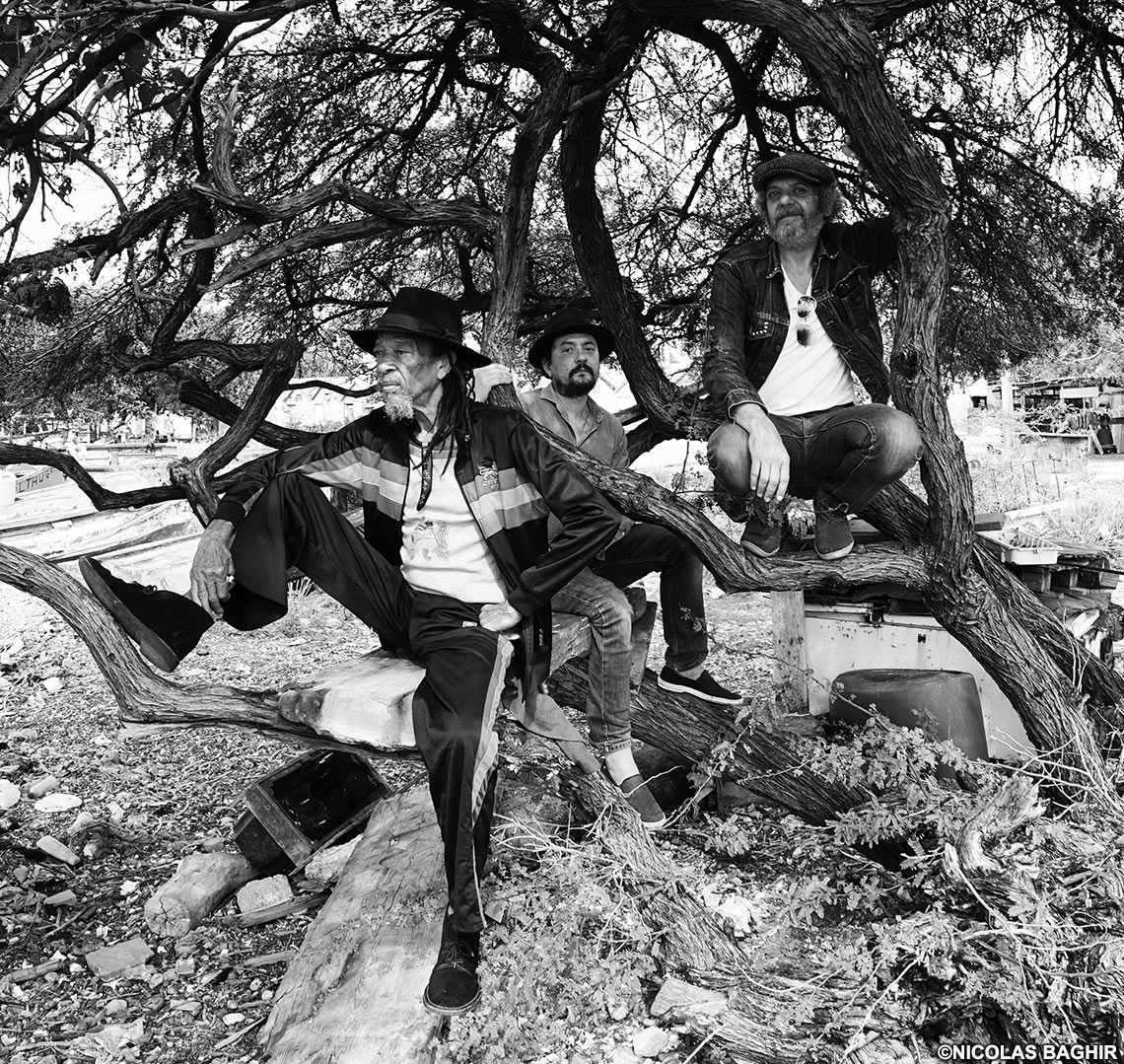
Bazbaz: What was very funny for me when I discovered the music of Kiddus is the movie was called Rockers. And it was just reggae music and Jamaican artists. I was like “Wow this is beautiful”. That's what music is. I mean we put names on the style but in fact it's the feeling. It's what's in your mind. It's more than just a style of music. The feeling is ultimate.
As well as making many styles of music, both of you have turned your hands to many different things creatively during your lives. Bazbaz, you play the bass, the keyboards, the harmonica, the melodica and percussion on the album. Kiddus you can draw, you're a poet, a drummer, you've been an actor, singer, activist, herbalist. You have each been involved in the film industry. Bazbaz, you've worked on film music. Kiddus, you've been involved in two major films. To use a French word, are you both Renaissance Men?
(Laughter)
Kiddus: It can be a part of it, yes. It's a part of it.
Bazbaz: Freedom!
And do you think that being skilled in many aspects of the creative arts is part of what drew you together?
Kiddus: That's a part of this. You know you never meet without some purpose. We don't know what might have been in the past life.
Bazbaz: I think me and Kiddus we fuck AI. We are completely against Artificial Intelligence, you know? Because Artificial Intelligence can't conceive the music we did, the friendship we have. Because this was not supposed to be. Kiddus was not supposed to do country songs. I'm a singer. I was not supposed to do this. We spent so many years of friendship. Each time Kiddus was coming to Paris, he was calling me to have a drink and afterwards have some fun. Because music is not so serious. It's important but it's not serious. We had a lot of fun, a lot of pleasure.
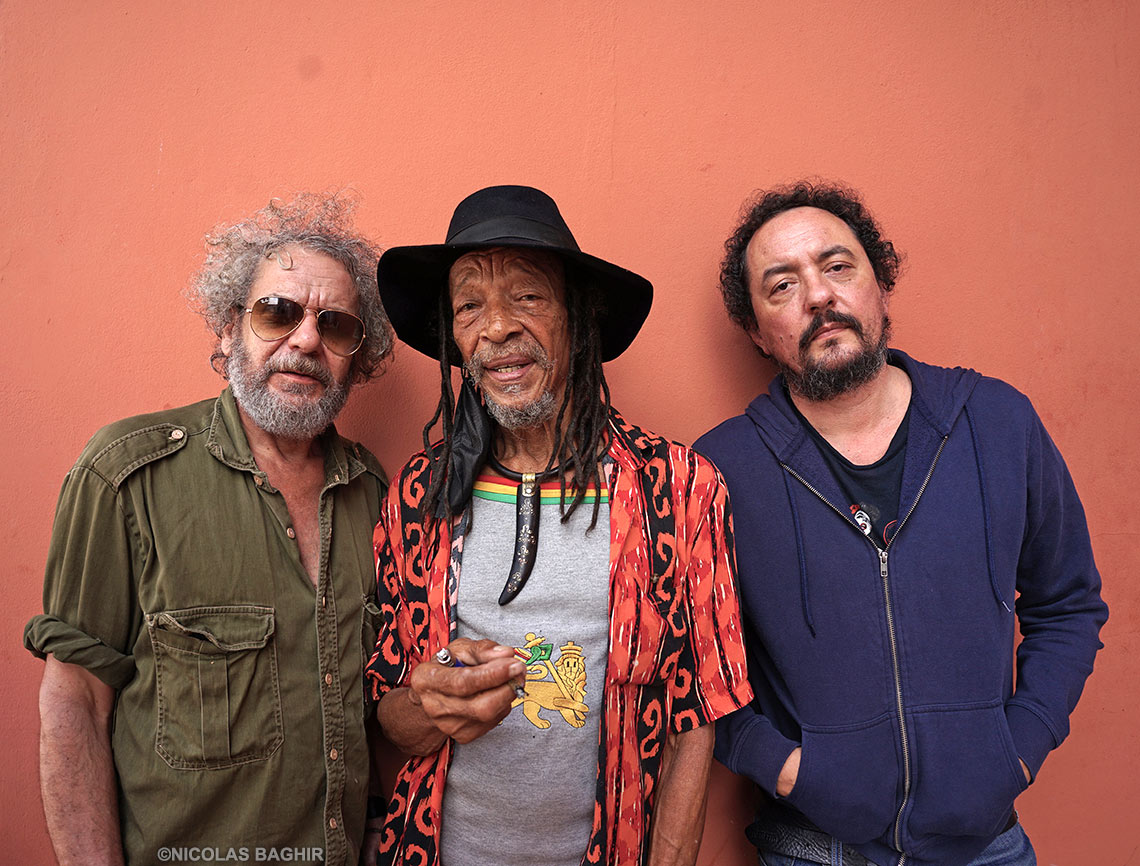
Kiddus: Good times a flow.
Bazbaz: It was like a dream and it was funny. We had a lot of laughs and a lot of life. A lot of love. It's not a bad word to say love. It's important. I love Kiddus.
Kiddus: And we see the good in the world. Regardless of what is happening.
Bazbaz: It's completely the opposite of AI.
Kiddus: You know something? I heard an alien in 1964 in the Roswell crash. And they were interrogating him and questioning him and they asked him of AI. In 1964. You know what the alien said? He said “AI almost destroyed our civilisation. And AI will destroy humanity in the future”. This was in 1960-fucking-4. But these master manipulators, my brother, are now about 300 years more advanced than you know.
What they have done over the last 30 years is to create a mindset of these youngsters growing up, through music. Because in ‘96 the music industry called for a meeting in LA and they told the artists, the rappers “You have to change your rhetoric on your lyrics. You have to glorify gangsterism, drugs and defame women. Make your message below the waist. Don't go up above the waist to the heart and brain. Keep these kids in the physical belly, to eat, to drink, to fuck and at the same time make women seem like they are sluts in every way”.
Why was this? Mainly because the music positively is a threat. But also privatisation of the prison system. Prisons were being privatised and run and not owned by the government. The government was giving them money. And every prisoner you have you get more money. So they used that to entrap the youngsters.
That leads me to ask about the song Wiggling which is very much about men's perceptions of women. This is quite a positive song about a woman doing what she wants and ignoring outside influences. What inspired that lyric?
Kiddus: I was just looking at women and having a mother who I fully respected and loved. And because of her I am able to respect women.
You told me before that your mother was a singer. She had a nice voice.
Kiddus: She had a beautiful voice. Fantastic. My dad also was a singer.
You told me he used to listen to Mario Lanza.
Kiddus: (laughs) Yeah. Enrico Caruso. Mario Lanza. All of those guys I grew up around. And all of the blue singers out of America, the jazz singers. Because my dad had about 300-odd records. 45s, and we had a gramophone. That you'd wind up and it would play the music. So I grew up seeing that. Wiggling was just my looking at a woman and saying “Hey man, let her be free. With her earphones on her ear. She's not listening to anyone. She's not observing this or that. She's just going on her way. Skipping and bouncing to the music”. It's like the Girl From Ipanema, you know? But that's the way it should be for ladies, to be free walking down the street. She could be a mother, a sister, a sweetheart or a wife. That's what we want to see. We don't want her to be harassed. I don't want her to be fucked around when she's walking on the streets. So that was mainly a message for the women in a sense but also saying “Hey brothers”.
Talking to the men. Saying check yourself.
Let her be free, man. Even as a 12-year-old I defended my mother because she was a beautiful lady. Sometimes when we would go out a man would want to chat her up. And sometimes I have to curse off some of them and say “Bumbaclot, go about your business”. As a little boy. So I saw that. Just walking the streets round the metropolis and thing. The attitude of some men towards women. That's how they're seen. That's how they degrade women.
The first song Choices has Sly Dunbar on drums. How did he come to be on the record?
Kiddus: It's my friend, man.
Bazbaz: It was Kiddus. He grew up with all these great musicians all these years ago. I already worked with Sly and Robbie a long time ago with Winston. When I was a kid, 15 or 16 years old, it was my dream to work with all of Kiddus’ musician friends like Sly and Robbie and all the great Jamaican musicians.
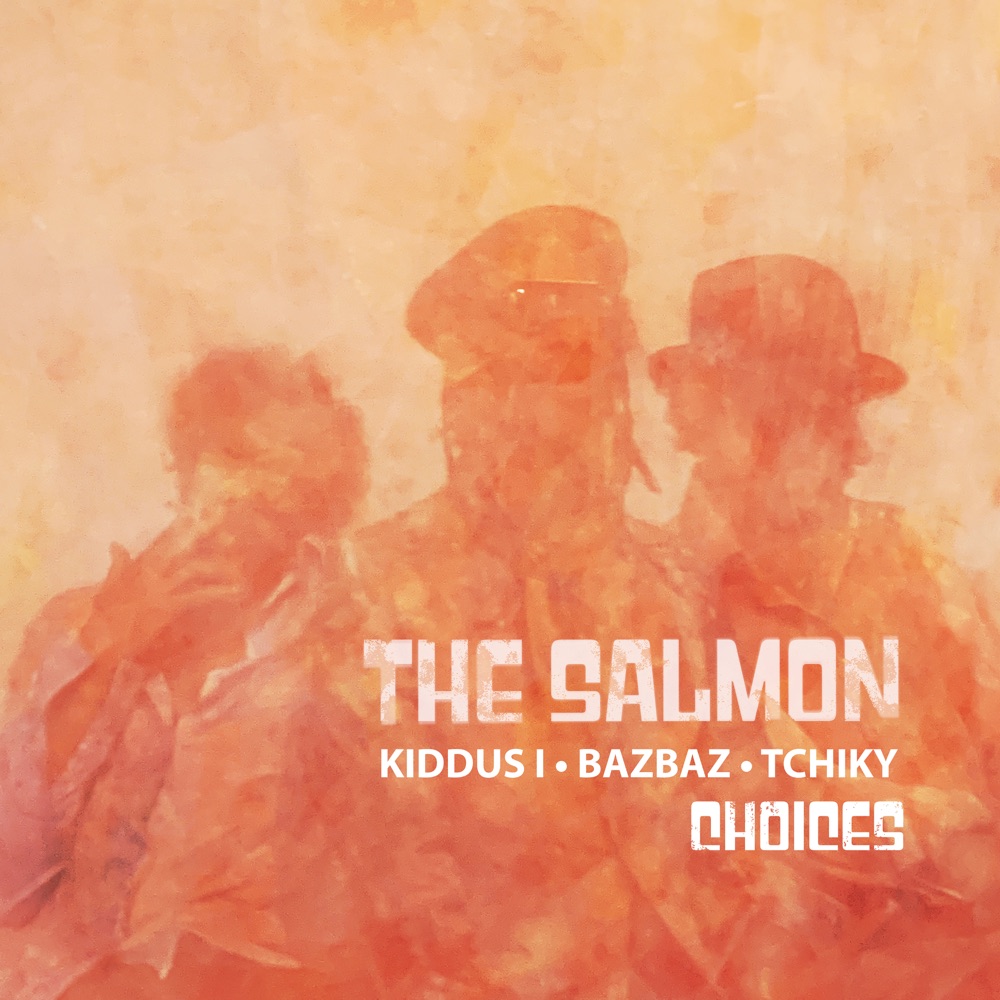
Kiddus. Like Familyman.
Bazbaz: I need meaning in my music. It has to mean something to me. I didn't just want the record company to pay Sly and Robbie and they come for five minutes. I need heart in my music. I don't say that Sly Dunbar is my friend. Kiddus is my friend. When I go to Jamaica I don't go there to do music for me. Each time I went there, three times, it was to make music for Jamaican artists. So when I wanted to cross the Atlantic to work with these beautiful musicians, it was to work for Jamaican artists. It's not specially for me. Maybe I have recorded two songs with Sly and Robbie for me. But it was not the goal. It was to meet the people, to meet these guys, I wanted them to work on my music but for the beautiful singer Kiddus or Winston McAnuff. So it means something. I was not like a stupid whitey coming there with the money of the record company and bye-bye.
Kiddus: You don't get a rootsy feel. You can't drop into a rootsy feel.
Serge Gainsbourg worked with great Jamaican musicians like Sly and Robbie, Mikey Chung and Robbie Lyn.
Bazbaz: And the tambourine of Sticky Thompson!
What was your first trip to Jamaica like?
Bazbaz: It was mad. I don't know if you know this TV series? In French it was called L'Ile Fantastique - Fantasy Island. With this guy Ricardo Montalbán. The big Ricardo and a small man [Tattoo, played by Hervé Villechaize]. In this movie every rich man was going to realise his dream. So when I left Jamaica for the first time, I looked at the window of the aeroplane to see if I didn't see these two guys waving me goodbye! Because it was really like a dream.
I met Kiddus there and we were already friends. It was like a fantasme. Everybody was nice because Jamaica is a heart place. A tough place, it is not easy. And it was like I was at home. I was feeling at home because I know the sense of humour of Jamaica. Smoking good weed, having good times, recording seriously with very professional Jamaican musicians. And the engineers are so professional. I rarely saw this in France. So I was very impressed. The engineer was respecting me saying “What do you think, is it okay?” Sly Dunbar, the first time he asked me “What should I play?” I told him “But usually when a drummer asks me ‘What do I play?’ I tell him ‘Play like Sly Dunbar!’” But he said “You're the boss, Bazbaz”. I said “No, do what you feel”. So it was very nice, very, very nice. I love Jamaica.
Kiddus: Music is plaiting. Like you plait a rope. You have different strings around it. Each musician is a string. That cord. Because each one is a cord but to make a rope you need maybe five cords. Or seven cords. But you plait and you plait. That is unity of creating. Because each individual sometimes has a piece to play and when it's all come together that is beauty.
Bazbaz: The first time I met Sly Dunbar in Paris in a show with Winston, I asked Sly why he did all this movement with his arms? It was so beautiful to see the gestures. I asked him “Do you play this way for the show or what?” So he looked me in the eyes and he said “No, music is attitude”. And since 15 years ago I still have this in my mind. Music is not just playing notes, it's a lifestyle, it's a way of living. Seeing things. So music is attitude, yes definitely.
I wanted to ask about the song Shakespeare. We talked about Rockers earlier and your colleague in Rockers, Gregory Isaacs, was a big fan of Shakespeare. He quotes Othello in the song Thief A Man and he even called himself William Shakespeare on an early tune.
Kiddus: You know Toothy, he used to check me at least five times a week. Sometimes every day. When he'd come from the race track over at Caymanas, he'd come straight to me at 1c Oxford Road. This was when I was called Dr Feelgood (points at spliff) because we defended this. And I had the best of this. But apart from that we had a good rapport. Himself and Bob Andy were actually the two closest musicians to me. I've known Cat Coore for so long and all of them over the years because in 1960-something I put Inner Circle with Cat on stage a number of times. When Cat was like 13 and the oldest one was 17.
This was the early lineup of Inner Circle with Cat in, before Third World.
Kiddus: This was like maybe 1969, before Third World. But myself and Gregory had a serious connection. I sort of eased back after the… took over too much. But Toothy, Gregory told me around 1972 “Yo Kiddie, if you nah record by next year we stop talk to you!” (laughs) Serious, you know? If I don't record by next year, him stop talking to me. And Mr Keith Anderson. Bob. You know the two Bobs to me were the best writers in the business. Bob Marley and Bob Andy. Gregory Isaacs was up there.
So what inspired you to talk about Shakespeare?
Kiddus: When I look back, I wish I knew, because I heard news, not concrete, that it's not Shakespeare who wrote his books. It was a black woman. And her signature is on the number that they have found. She was like a princess in England. She was a poetess. And she is the one who wrote most or all of Shakespeare. Given to him as a white man. But I was using him because I think it was Shakespeare who said “All of the world is a stage”. And it was showing that verse which is known and I accept as a truth in itself. Because it explains life. It's a stage that we are on. And we are merely players on life stage. And we now have to learn to play the game of life. And having read Shakespeare in school I have a way of writing stuff.
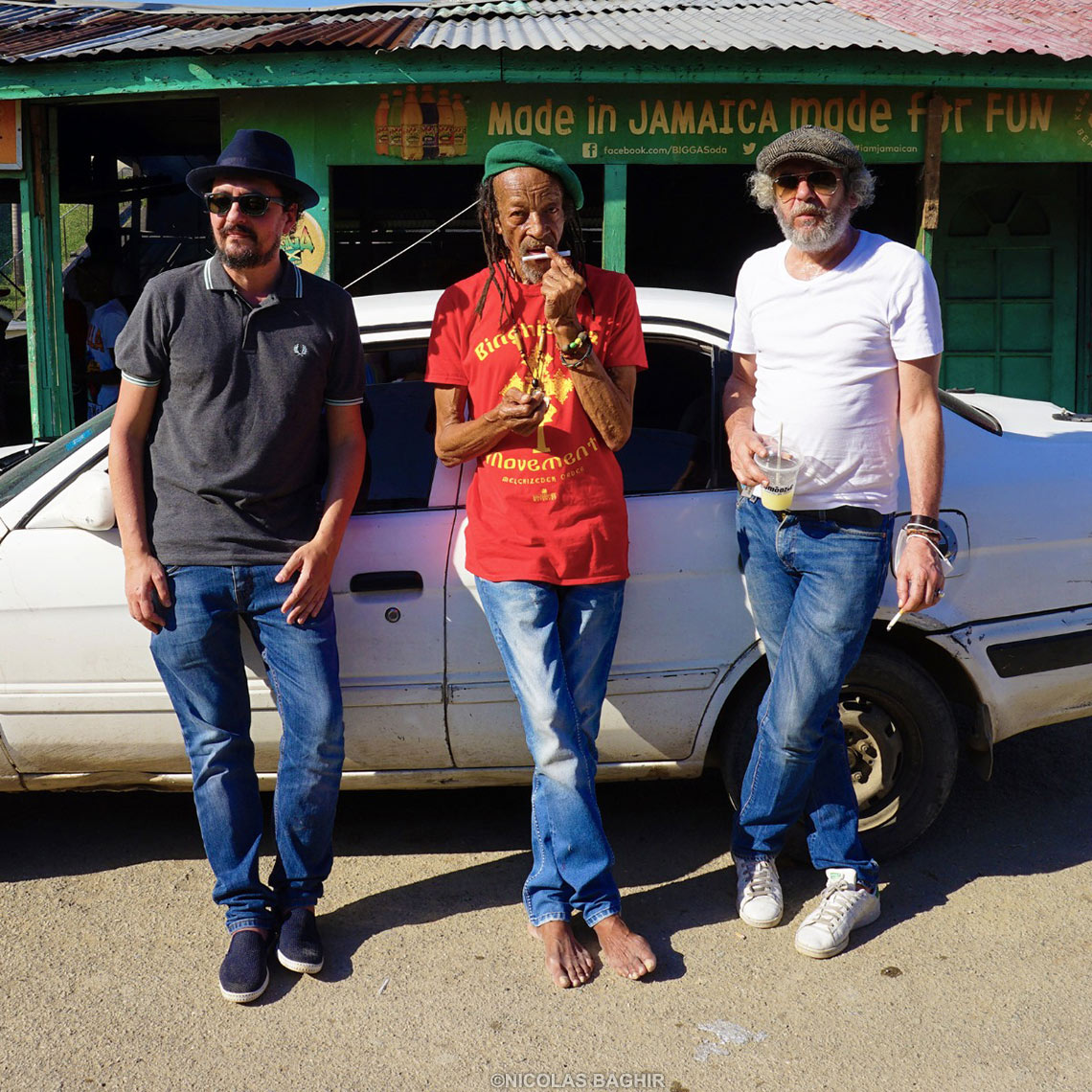
How did Style Scott and Flabba Holt end up playing drums and bass on the ska version of the title track The Salmon?
Bazbaz: The second time I went to Jamaica, working with Winston on the second record we did together, A Bang. Because the Roots Radics, Flabba Holt and Sly and Robbie are the friends of Kiddus and Winston. So it appears simply as they came to the studio and we started playing music together. I had this song called The Salmon. I wrote it before leaving Paris and going to Jamaica. I just had the Fender Rhodes riff and a little beat on it. No bass, no guitar, nothing. And I wanted to construct a song over this. And it appears that Flabba Holt loved the shit and called Style Scott to do the drums. And so we did a ska version of the song after in fact. The first version there is no drummer, just programming. A drum program. I remember we had a lot of fun because I was drinking rum in the studio. Style Scott was very happy I was drinking rum. Suddenly he left the drums and said to me “But you are drinking it dry”. I said “Oh fuck I have to go and take some ice”. So he left the drum, took the car and he went back half an hour after with some ice. And we had a lot of fun. Because music is rock and roll too.
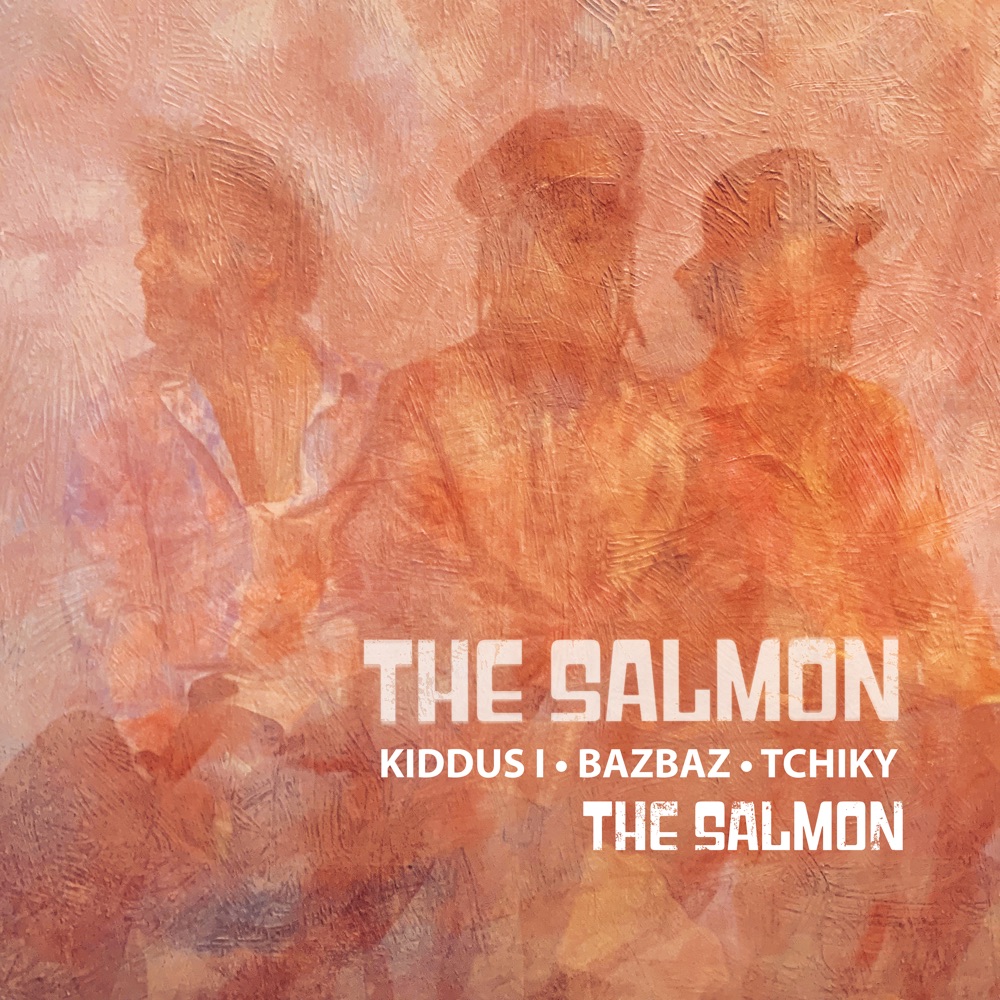
Kiddus: It's Rockers rocking man!
Bazbaz: Because music is important but it's not serious. We had a couple of days together.
What inspired the lyrics of The Salmon?
Kiddus: It's life again. I look at it like you come in the flesh. You have to grow out of the flesh. Just to be at one with the divine spark. Which they all play hide and seek within. You get no choice. But in the flesh you now have to go through that physical again to rise to return to that haven that we seek spiritually. So observing the salmon. That's what it does. Because it leaves a mountain river, goes down in the ocean, the ocean of life. It is then plagued, terrorised going through all kinds of travails trying to reach that haven. You've got the sharks, you've got the fish who they are eating, you've got mankind who is after them. But yet still a certain percentage forge the waves of life to return. And even on the return before going home, bears are there, taking them again. Yet still they make it. Recycle. And start over. That's what I think in a sense that I and I are similar in that sense in the purpose, vision, long run of life. To reach that ascendancy.
Bazbaz: It's so true. When Kiddus wrote this lyric, I was like wow. So original. Such a unique way. I was very surprised from a Jamaican to write. Kiddus I doesn't say ‘Rastafari’. I don't know, it was different from what I was used to hearing in Jamaican lyrics. It was, I don't know, so intelligent, so wow.
Philosophical.
Bazbaz: I would have dreamed of having this idea before Kiddus!
(Laughter)
Bazbaz: But he did it the first time. We had so much fun writing and recording this song. So we decided with Kiddus to call the project The Salmon. Because it's universal. It's life, like he said. It was a crazy way to talk about humanity. A mad way to talk about life. Really very original.
We didn't talk about Tchiky very much. As well as playing guitar, he engineered a lot of the album.
Bazbaz: He engineered and he played guitar. He was a solid partner to organise all this mad adventure which was very difficult. Because Kiddus is living far - to organise everything. He wrote some music too. Shakespeare, he did Shakespeare especially for example. And he was the man I needed to make it complete.
Kiddus: And enhance the work.
Bazbaz: Me and Kiddus we are madmen! We are mad. We are mad motherfuckers!
Kiddus: So Tchiky was the ground. In between the two extremes.
Bazbaz: He was the balance, helping us. Because he is a quiet man. He doesn't smoke, he doesn't drink. Not like me and Kiddus. (laughs) So it wasn't important to have a partner really solid like this. A solid man.
Bazbaz, Winston told me the story of how you met backstage at one of his shows in a few previous interviews, but I would like to hear it from your side…
Bazbaz: Well woman is the key no? The big key of creation. He's a mad motherfucker. He told you the story! (laughs) The story that my girl left for the backstage of a concert of Winston. The first time I met Winston, I saw Winston on stage when she disappeared suddenly and went backstage. I was like a mad jealous lover. My love stories are a big inspiration to Winston's lyrics. Because I am his hostage. He doesn't dare to talk about his own private life so he talks about mine.
(Laughter)
Bazbaz: Because I never go backstage to see the artists because I respect this place too much. Even when it is some friends I don't go like this even if I can. But this time I said to the bodyguards “Fuck off I have to go there!” So I arrived backstage with my big eyes. And it was nothing. Everything was easy. He has always checked the trouble. And we laughed together and I felt stupid. And it was the beginning of our friendship. So women, women, women.
He also told me that when you first worked together on music he told you not to play reggae.
Bazbaz: Such a clever motherfucker. You know it is mad because my grandmother, she was from Bretagne she used to say and I don't know how to translate this in English but, “Ce n'est pas à une Bigoudène qu'on apprends à faire des crêpes” [similar to the British idiom “Don’t teach your grandmother to suck eggs”]. But it means what Winston said. “I don't need you to play reggae”. It was very interesting because it was my dream to work with a reggae artist. I was already 35 years old. I was a grown-up man and a musician. So I started to play reggae for him. After 2 or 3 hours I understood it was bullshit. He was always telling me “Not like this, not like that”. I was like “Fuck you, I have to go home. And I don't want to see you anymore, ever”.
And after I went back home and this girl, she asked me “How was it?” I said “Winston… it is impossible to work with this guy”. And she said “But did you make him listen to your own songs?” I was feeling so stupid but I said “No, I played reggae because he is a Jamaican”. “You like reggae, I like reggae, let's play reggae”. And she told me “You're stupid, you should have made him listen to your own songs”. So I was like “Oh you bullshitting girl blah blah blah” but then all night I was like “Fuck, she's right”.
In the morning I called Winston back and said “I'm sorry for yesterday, it was not so easy. But if you agree we can meet again and listen to some other stuff”. So he came back to the studio and I made him listen to my own songs. And he said “Wow I love it, take off your voice, I have an idea”. I love this attitude with Jamaican musicians that a song is a song and music is music. From an instrumental you can make 25,000 different songs because it's a vision. It's a vision of the harmony atmosphere. A lot of French musicians told me “You are not vexed? That Winston said ‘Take off your voice?’” I was fucking not vexed because I'm used to this Jamaican attitude. I loved reggae since the age of 15. I was so happy. And I'm still working on this with the project with Kiddus. They are kind of in the same spirit. I mean music is freedom and it is so clear that they don't need me to do reggae. I can play reggae but what is interesting is to mix our different cultures so that I can bring my French attitude, I don't know what. It was so refreshing.
Kiddus: That's the plaiting man. And okay reggae is from Jamaica but Jamaicans play a very wide assortment of music. More so than many people around the world.
Bazbaz: It was a big lesson. It was a big lesson of music.
Your work with Winston did a lot for his career in France. The song Sort Me Out was used in a big French film [Hors De Prix]. And he went on to do more fusion albums with yourself and others afterwards. You could say it started a trend. Do you have high expectations for this project with Kiddus?
(laughs) I have big, big, big, big expectations. It was difficult. It took me and Kiddus 17 years to do this. And this Salmon album project, it's my personal Moby Dick, white whale, like chasing something. Something you will never capture. I have big expectations for this album.
Kiddus: With proper marketing and promotion because this LP sort of speaks to the world. It's not one-dimensional, it's multi-dimensional. Musically-wise and stuff. If it's given the proper promo, I think people will be drawn to it.
Are you planning to tour this project?
Bazbaz: We do a big show in Paris at the end of November. The 22nd of November. And we really want to go on tour. That is our goal. Right now to release the album and to go on tour to play this music live and direct. It's very important.
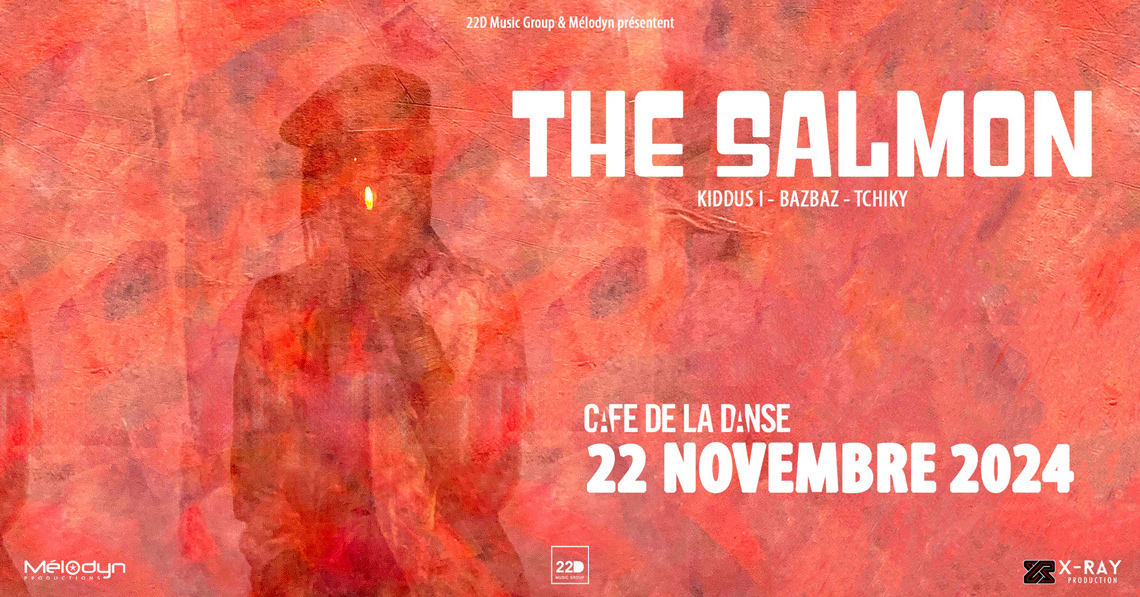
Kiddus, I want to finish by going back to Rockers. In the scene where you sing Graduation In Zion you can see Robbie Shakespeare, Chinna, Wire Lindo and Sticky Thompson. Who actually played on the recording of Graduation In Zion?
Kiddus: It's the same crew. What they did was I recorded on a Philips studio, they came in with a field machine and recorded live in the studio. I paid for my studio. I paid for my musicians. They came in on my time and recorded me doing that song. So Sticky was on it, Wire Lindo and a brother who was a brilliant keyboard player. He went to England and studied at the school of music. Belly Lloyd? I think we called him Belly Lloyd. But I actually went back into the studio afterwards and overdubbed the horn tracks. The horns weren't on the original recording. Because they took just the live rhythmic track when I was recording. But I did more work on that track and that tape. I had it in the States and I came down to the airport and something or other happened and they disappeared. But I've done another track of it. With the Inna De Yard wind ensemble. Musicworks, Gussie Clark studio. [Anchor] With Queen Omega singing with me on the track. I want to release it maybe by November. And I had a cover of [The Kingstonians] Singer Man. I did a cover and just three weeks ago I had Beenie Man come on and do a collab. So Beenie Man and I are on this Singer Man and I'm going to make a 45.









